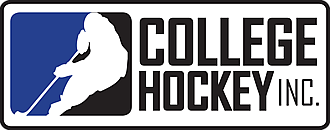Thursday, April 21, 2016
Hockey Tops NCAA APR Again
Men’s hockey shows best academic numbers of any sport for third straight year.

The academic success of NCAA Division I men’s hockey players continues to set the standard across college sports, with hockey leading all men’s sports in the NCAA’s Academic Progress Rate (APR) for the third straight year.
Men’s hockey’s four-year average APR score of 987 from 2011-15 is eight points above the NCAA average and a two-point improvement from last year’s score. Hockey edged gymnastics (986) and volleyball (985) for the top spot and, with 59 teams, is the only sport among the top five with more than 22 teams.
NCAA Release | NCAA Averages & Trends Report (.pdf)
The APR, created in 2003 to measure Division I schools and teams on their student-athletes’ success in the classroom, awards points to teams based on students’ grades, their progress toward their degree and for staying in school. Teams are also rewarded in the APR for students who return to school to complete their degree.
The APR is related – but not identical – to the NCAA’s Graduation Success Rate (GSR), serving in a way as a predictor of GSR success. Men’s hockey’s 88.5% graduation rate for student-athletes who enrolled in 2008 is among the top.
Hockey’s single-year APR score for 2014-15 of 988 also led all men’s sports with 50 or more programs. Hockey’s single-year eligibility rate (992) and retention rate (981) also ranked first.
#NCAAhockey and #NCAAgym are tops in APR for both men and women. pic.twitter.com/IjnJB0bcxH
— NCAA Research (@NCAAResearch) April 20, 2016
The calculation of APR also rewards teams when former student-athletes return to school to complete their degree. In the past year players like Justin Abdelkader (Michigan State) and Chris Kreider (Boston College) have completed their undergraduate degrees despite leaving school early to play in the NHL.
Not only is hockey excelling on average as a whole, but each of the individual teams has demonstrated success. Across all sports, APR scores below 930 are subject to penalties, but no men’s hockey teams are within 25 points of that threshold.
Six teams – Canisius, Colgate, Dartmouth, Merrimack, Minnesota and Robert Morris – had perfect four-year average APR scores of 1,000. More than 76 percent of all teams (45 of 59) had four-year APR scores of at least 980 and nearly half (25 of 59) have scores of at least 990.
